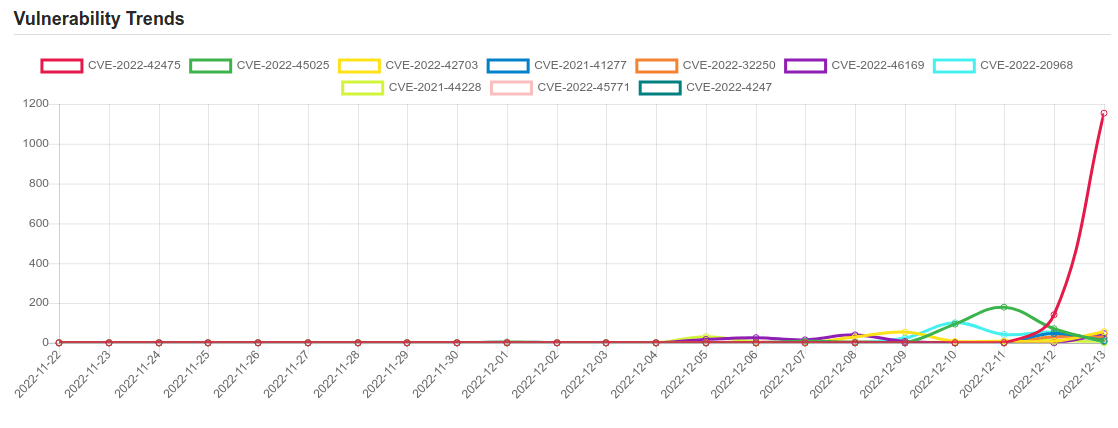Daily Vulnerability Trends: Wed Dec 14 2022

| CVE NAME | CVE Description |
| CVE-2022-27518 | Unauthenticated remote arbitrary code execution |
| CVE-2022-3602 | A buffer overrun can be triggered in X.509 certificate verification, specifically in name constraint checking. Note that this occurs after certificate chain signature verification and requires either a CA to have signed the malicious certificate or for the application to continue certificate verification despite failure to construct a path to a trusted issuer. An attacker can craft a malicious email address to overflow four attacker-controlled bytes on the stack. This buffer overflow could result in a crash (causing a denial of service) or potentially remote code execution. Many platforms implement stack overflow protections which would mitigate against the risk of remote code execution. The risk may be further mitigated based on stack layout for any given platform/compiler. Pre-announcements of CVE-2022-3602 described this issue as CRITICAL. Further analysis based on some of the mitigating factors described above have led this to be downgraded to HIGH. Users are still encouraged to upgrade to a new version as soon as possible. In a TLS client, this can be triggered by connecting to a malicious server. In a TLS server, this can be triggered if the server requests client authentication and a malicious client connects. Fixed in OpenSSL 3.0.7 (Affected 3.0.0,3.0.1,3.0.2,3.0.3,3.0.4,3.0.5,3.0.6). |
| CVE-2022-41128 | Windows Scripting Languages Remote Code Execution Vulnerability. This CVE ID is unique from CVE-2022-41118. |
| CVE-2021-22437 | There is a software integer overflow leading to a TOCTOU condition in smartphones. Successful exploitation of this vulnerability may cause random address access. |
| CVE-2022-44698 | Windows SmartScreen Security Feature Bypass Vulnerability. |
| CVE-2022-37958 | SPNEGO Extended Negotiation (NEGOEX) Security Mechanism Information Disclosure Vulnerability. |
| CVE-2021-39993 | There is an Integer overflow vulnerability with ACPU in smartphones. Successful exploitation of this vulnerability may cause out-of-bounds access. |
| CVE-2022-40259 | AMI MegaRAC Redfish Arbitrary Code Execution |
| CVE-2022-42475 | No description provided |
| CVE-2022-45025 | Markdown Preview Enhanced v0.6.5 and v0.19.6 for VSCode and Atom was discovered to contain a command injection vulnerability via the PDF file import function. |
| CVE-2022-42703 | mm/rmap.c in the Linux kernel before 5.19.7 has a use-after-free related to leaf anon_vma double reuse. |
| CVE-2021-41277 | Metabase is an open source data analytics platform. In affected versions a security issue has been discovered with the custom GeoJSON map (`admin->settings->maps->custom maps->add a map`) support and potential local file inclusion (including environment variables). URLs were not validated prior to being loaded. This issue is fixed in a new maintenance release (0.40.5 and 1.40.5), and any subsequent release after that. If you’re unable to upgrade immediately, you can mitigate this by including rules in your reverse proxy or load balancer or WAF to provide a validation filter before the application. |
| CVE-2022-32250 | net/netfilter/nf_tables_api.c in the Linux kernel through 5.18.1 allows a local user (able to create user/net namespaces) to escalate privileges to root because an incorrect NFT_STATEFUL_EXPR check leads to a use-after-free. |
| CVE-2022-46169 | Cacti is an open source platform which provides a robust and extensible operational monitoring and fault management framework for users. In affected versions a command injection vulnerability allows an unauthenticated user to execute arbitrary code on a server running Cacti, if a specific data source was selected for any monitored device. The vulnerability resides in the `remote_agent.php` file. This file can be accessed without authentication. This function retrieves the IP address of the client via `get_client_addr` and resolves this IP address to the corresponding hostname via `gethostbyaddr`. After this, it is verified that an entry within the `poller` table exists, where the hostname corresponds to the resolved hostname. If such an entry was found, the function returns `true` and the client is authorized. This authorization can be bypassed due to the implementation of the `get_client_addr` function. The function is defined in the file `lib/functions.php` and checks serval `$_SERVER` variables to determine the IP address of the client. The variables beginning with `HTTP_` can be arbitrarily set by an attacker. Since there is a default entry in the `poller` table with the hostname of the server running Cacti, an attacker can bypass the authentication e.g. by providing the header `Forwarded-For: |
| CVE-2022-20968 | A vulnerability in the Cisco Discovery Protocol processing feature of Cisco IP Phone 7800 and 8800 Series firmware could allow an unauthenticated, adjacent attacker to cause a stack overflow on an affected device. This vulnerability is due to insufficient input validation of received Cisco Discovery Protocol packets. An attacker could exploit this vulnerability by sending crafted Cisco Discovery Protocol traffic to an affected device. A successful exploit could allow the attacker to cause a stack overflow, resulting in possible remote code execution or a denial of service (DoS) condition on an affected device. |
| CVE-2021-44228 | Apache Log4j2 2.0-beta9 through 2.15.0 (excluding security releases 2.12.2, 2.12.3, and 2.3.1) JNDI features used in configuration, log messages, and parameters do not protect against attacker controlled LDAP and other JNDI related endpoints. An attacker who can control log messages or log message parameters can execute arbitrary code loaded from LDAP servers when message lookup substitution is enabled. From log4j 2.15.0, this behavior has been disabled by default. From version 2.16.0 (along with 2.12.2, 2.12.3, and 2.3.1), this functionality has been completely removed. Note that this vulnerability is specific to log4j-core and does not affect log4net, log4cxx, or other Apache Logging Services projects. |
| CVE-2022-45771 | An issue in the /api/audits component of Pwndoc v0.5.3 allows attackers to escalate privileges and execute arbitrary code via uploading a crafted audit file. |
| CVE-2022-4247 | A vulnerability classified as critical was found in Movie Ticket Booking System. This vulnerability affects unknown code of the file booking.php. The manipulation of the argument id leads to sql injection. The attack can be initiated remotely. The exploit has been disclosed to the public and may be used. The identifier of this vulnerability is VDB-214624. |
| CVE-2022-40684 | An authentication bypass using an alternate path or channel [CWE-288] in Fortinet FortiOS version 7.2.0 through 7.2.1 and 7.0.0 through 7.0.6, FortiProxy version 7.2.0 and version 7.0.0 through 7.0.6 and FortiSwitchManager version 7.2.0 and 7.0.0 allows an unauthenticated atttacker to perform operations on the administrative interface via specially crafted HTTP or HTTPS requests. |
| CVE-2020-4463 | IBM Maximo Asset Management 7.6.0.1 and 7.6.0.2 is vulnerable to an XML External Entity Injection (XXE) attack when processing XML data. A remote attacker could exploit this vulnerability to expose sensitive information or consume memory resources. IBM X-Force ID: 181484. |
A considerable amount of time and effort goes into maintaining this website, creating backend automation and creating new features and content for you to make actionable intelligence decisions. Everyone that supports the site helps enable new functionality.
If you like the site, please support us on Patreon using the button below

To keep up to date follow us on the below channels.





![Cobalt Strike Beacon Detected - 139[.]9[.]135[.]76:443 7 Cobalt-Strike](https://www.redpacketsecurity.com/wp-content/uploads/2021/11/Cobalt-Strike-300x201.jpg)
